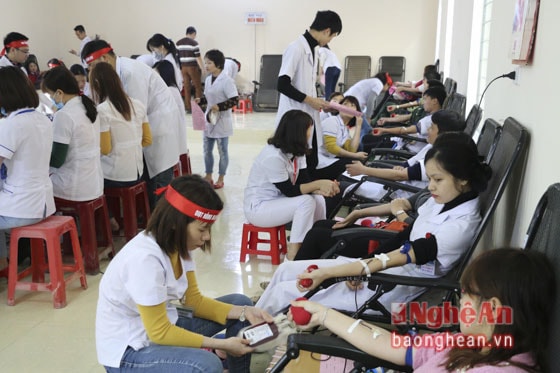Medical ethics through the '8 words of construction' and '8 crimes' of famous physician Le Huu Trac
(Baonghean.vn) - 'Medicine is a humane art whose duty is to preserve people's lives, to care about people's worries, to be happy about people's happiness, to only help people, to do one's duty without seeking personal gain or credit' - the view on medical ethics of a physician by Hai Thuong Lan Ong Le Huu Trac.
» Priest Nguyen Dinh Thuc incited parishioners
Hai Thuong Lan Ong Le Huu Trac was born on November 12, Canh Ty year (December 11, 1720), passed away on the full moon of January, Canh Hoi year (1791) at the age of 71. His hometown was Van Xa village, Duong Hao district, Thuong Hong prefecture, Hai Duong province (now Lieu Xa, My Van, Hai Hung). He was a great physician, a great cultural figure of our country, the author of the famous book Lan Ong Tam Linh or Hai Thuong Y Tong Tam Linh. Hai Thuong Lan Ong's medical career greatly contributed to the development of the country's traditional medicine, so he was honored as the Great Physician of Vietnam.
 |
| Hai Thuong Lan Ong Le Huu Trac (1720-1791). Photo archive |
Lan Ong repeatedly emphasized, “Medicine is a noble profession, a profession of compassion…” From that, his ethics, responsibility, motivation, attitude, style, professionalism… all reached a special height.
In the article “Medical teachings” of the book “Y tong tam linh” in the first part, it is clear that he highly values medical ethics. In the book “Y am an” he emphasized many times that “Medicine is a humane profession”. According to him, “Humanity” is a basic virtue of a medical practitioner. That basic virtue should be a prerequisite for entering the medical profession: If you do not have humanity, do not know how to care for others, then you should make a living in another profession that requires less humanity.
He said: “I often realize that: doctors have the duty to protect people's lives; life and death, good and bad luck are all in their hands. How can someone with insufficient intelligence, inconsiderate actions, without a broad mind, and without courage and prudence dare to follow the path of medicine?”
To him, a true physician needs to have eight words: Humanity, intelligence, virtue, wisdom, generosity, sincerity, modesty, diligence, and hard work.
 |
| "Pink drops in white blouse" is an activity maintained by the Nghe An health sector for many years to promote the sense of responsibility of medical workers. Photo: Document |
At the same time, we also need to avoid committing eight sins: "Laziness, stinginess, greed, ignorance, evil, narrow-mindedness, and immorality":
- Lazy: Should have examined carefully before prescribing medicine, but afraid of the night, rain, wind, and hardship, so did not come to visit in person, just prescribing medicine carelessly, that is the sin of Laziness.
- Stingy: Seeing that a disease needs a certain medicine to cure it, but the doctor is worried that the patient cannot afford it, so he gives a cheaper medicine (affecting the treatment's effectiveness). That is the sin of Stingy.
- Greed: seeing the danger of illness, but the doctor did not immediately tell the family the truth, just kept on coming to make money. That is the sin of greed.
- Lying: Seeing that it is easy to lie, frowning, sticking out tongue, scaring people to get more money. That is the crime of deception.
- Ignorance: vague recognition, shallow and biased learning, and inconsistent prescription. That is the sin of ignorance.
- Evil: Seeing that it was a difficult disease, he should have told the family the truth and tried his best to cure it, but he was afraid of being known as someone who didn't know how to cure it, and was afraid of not being successful and not getting much money, so he refused to accept the treatment and just let the person give up and die. That is the sin of not admitting.
- Narrow-mindedness: There are people who are usually upset with you, but when they are sick and need your help, you have thoughts of revenge and are not willing to put all your effort into treating them. That is the sin of narrow-mindedness.
- Immoral: Seeing orphans, widows, or people from good, filial families but in poverty, feeling sorry for the wasted effort [not getting much money] and not trying to help. That is an immoral sin.
He affirmed that the medical profession is closely related to one's own morality and that of one's descendants in the long run. He said: "Medicine is a noble discipline to preserve life, and is also a great source of true morality." Through the medical profession, one can cultivate "virtue" to a high level if one truly helps the sick.
But if that person takes advantage of the medical profession to intentionally or unintentionally do things that are harmful to others, it is easy to commit a small amount of "immorality". He complained: "Alas, using humaneness to deceive, using kindness to trade. In this way, the living blame, the dead resent, it is unforgivable."
He often taught his students: "Being a doctor without compassion (tu) and helping others (te) as a constant heart, without deep thought to find ways to save lives but only focusing on calculating benefits, taking property and harming others is no different from being a robber."
In short, according to him, after confirming that medicine is a “virtuous” profession, a physician must always think about the four words “Compassion, Kindness, Activity, and Humanity” and daily cultivate the “Eight Building Words” and fight against the “Eight Sins”. Only then will one not be ashamed of the two words “Humanity”.
Pear Flower
(Synthetic)


